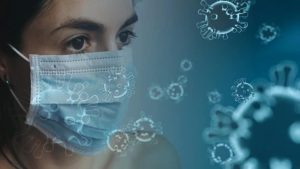
COVID-19
Coronavirus disease (COVID-19) is an infectious disease caused by the SARS-CoV-2 virus.
The first case of COVID-19 was reported Dec. 1, 2019, and the cause was a then-new coronavirus later named SARS-CoV-2. SARS-CoV-2 may have originated in an animal and changed (mutated) so it could cause illness in humans. In the past, several infectious disease outbreaks have been traced to viruses originating in birds, pigs, bats and other animals that mutated to become dangerous to humans. Research continues, and more study may reveal how and why the coronavirus evolved to cause pandemic disease.
Most people infected with the virus will experience mild to moderate respiratory illness and recover without requiring special treatment. However, some will become seriously ill and require medical attention. Older people and those with underlying medical conditions like cardiovascular disease, diabetes, chronic respiratory disease, or cancer are more likely to develop serious illness. Anyone can get sick with COVID-19 and become seriously ill or die at any age.
The best way to prevent and slow down transmission is to be well informed about the disease and how the virus spreads. Be aware of your COVID-19 Hospital Admissions Level and the associated prevention steps. If the situation warrants, protect yourself and others from infection by social distancing, wearing a properly fitted mask, and washing your hands or using an alcohol-based hand sanitizer frequently. Stay up-to-date on your vaccines and follow local guidance.
The virus can spread from an infected person’s mouth or nose in small liquid particles when they cough, sneeze, speak, sing or breathe. These particles range from larger respiratory droplets to smaller aerosols. It is important to practice respiratory etiquette, for example by coughing into a flexed elbow, and to stay home and self-isolate until you recover if you feel unwell. Get tested as soon as possible when symptoms occur to determine whether you are infected with COVID-19.
COVID-19 FAQs, Updated September 2023
If it seems like more of your friends, family, and co-workers are testing positive for COVID-19, it’s because we are indeed experiencing an uptick of cases. Despite the end of the Public Health Emergency in May, the virus has continued to circulate steadily but at lower numbers and for most individuals, with less severe symptoms.
Data from the Massachusetts Virtual Epidemiological Network, also known as MAVEN, show the number of cases reported in Barnstable County to total 621 in August of 2023, versus the 270 that were reported in July. While these data do in fact demonstrate increased spread, they do not accurately reflect the true volume of cases in our community because 1.) home tests are not reported or tracked and 2.) not everyone who experiences symptoms of the virus gets tested. It is important to note that COVID related deaths in Barnstable County since the end of the state of emergency on May 11th have remained low, totaling 12 at the end of August.
Many people, especially those who are young and healthy, experience symptoms of the virus to resemble those of allergies or a cold. Therefore, it is becoming increasingly common for people to carry on with their daily lives unaware that they have the virus and are exposing others. This behavior continues to drive spread.
The most recent strains of the virus, also known as EG.5 and FL.1.5.1, are members of the Omicron family. As of September 2nd, EG.5 was the most prominent strain in the United States accounting for approximately 20% of cases. To see what other variants are circulating, see the Center for Disease Control’s variant tracker here.
Just like the common cold and flu, the COVID-19 virus is a respiratory illness for which we can employ basic precautionary measures to decrease the chance of getting sick.
Hand washing, not touching your face, and keeping up to date on vaccinations are all effective prevention measures. Keeping your body healthy with good nutrition and regular activity also promotes a robust immune system. While many of us feel disappointed that vaccines do not make us 100% immune, they do reduce the severity of illness and risk for hospitalization and death. Vaccines introduce an inactive part of the virus to your immune system so if you are exposed and/or infected your body is ready to mount an effective response. You can also choose to mask at any time if your health is vulnerable or you are attending a crowded indoor space where you don’t know the health status of others.
It’s also important to take measures to protect others from getting sick, especially vulnerable populations including the elderly and immunocompromised.
- Fever or chills
- Headache
- Cough
- Shortness of breath or difficulty breathing
- Fatigue
- Muscle or body aches
- New loss of sense of taste or smell
- Sore throat
- Congestion or runny nose
- Nausea or vomiting
- Diarrhea
- In elderly, chronically ill, or debilitated individuals such as residents of a long-term care facility, symptoms of COVID-19 may be subtle (i.e., alterations in mental status or changes in blood glucose control)
You should take a home test if:
- You develop any symptoms of COVID-19, even if they are mild.
- If you have a known exposure to someone with the virus, you should test on day 6 following that exposure.
- You’re planning to spend time with someone who is at high risk for severe COVID-19 (due to older age or medical conditions), especially if you are in an area with medium to high hospitalization rates.
For detailed information, visit the CDC’s webpage: Testing for COVID-19 or see this easy-to-follow testing flowchart.
Safe, effective, and accessible COVID-19 testing is available without an appointment at all Cape Cod Healthcare Urgent Care centers for individuals who wish to be seen by a provider for their symptoms. Additionally, walk-in rapid testing is available at Urgent Care for individuals without symptoms who are seeking testing for travel or health monitoring (with an out-of-pocket cost of $125).
The U.S. government continues to make COVID-19 tests available to uninsured individuals and underserved communities through existing outreach programs. Go to COVID-19 Tests for more information.
Have expired tests? Before tossing your expired COVID-19 home test kit in the trash, check the Federal Drug Administration (FDA) website to find out if the expiration date has been extended.
- If you test positive for COVID-19, isolation guidance remains the same: isolate for 5 days from symptom onset or positive test date if you don’t have symptoms.
- If your symptoms are improved and you no longer have a fever, on day 6 you may end isolation but continue to wear a mask around others through day 10.
- It is not necessary to retest, but if you want to, use an antigen or rapid test. Do not retest using a PCR test; PCR tests can pick up inactive virus for up to 90 days even when you are recovered.
Quarantine, which used to be required when you were exposed to someone with COVID-19, has been replaced with exposure guidance:
- Mask for 10 days
- Monitor for symptoms
- Test immediately if you become symptomatic or on day 6 if you have no symptoms.
If positive refer to isolation guidance above.
Treatment with the anti-viral Paxlovid is still available and recommended for individuals aged 12 and older who have tested positive for COVID-19, are at increased risk of severe disease, and have developed COVID-19 symptoms in the last 5 days, even mild ones (such as runny nose, sore throat, or cough). Qualifying conditions that put you at higher risk for severe disease include being over age 50, a current or former smoker, cancer, diabetes, lung disease, and obesity. Paxlovid can be prescribed by your primary care doctor or via Covid Telehealth.
Guidance at this time remains that everyone 6 years and older should get 1 updated Pfizer-BioNTech or Moderna COVID-19 vaccine, regardless of whether they’ve received any original COVID-19 vaccines. Children 6 months to 5 years are considered up to date with 2 Moderna vaccinations or 3 Pfizer vaccinations, with one of those being an updated version. See CDC infographics here.





